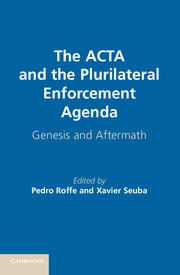Book contents
- Frontmatter
- Contents
- List of Contributors
- Foreword
- Acknowledgments
- Acronyms
- Introduction
- PART I THE FINAL ACT: ITS MAIN FEATURES AND CONTENTS
- PART II DOMESTIC LEGISLATIVE CHALLENGES
- 9 ACTA’s Constitutional Problem in the United States
- 10 Trick or Treaty?
- 11 A Brazilian Perspective
- 12 Lessons to Be Drawn from the ACTA Process
- PART III IMPACT ON RELATED PROCESSES
- PART IV VIEWS FROM STAKEHOLDERS: LESSONS
- PART V WHAT LIES AHEAD ACTA
- Annex I Anti-Counterfeiting Trade Agreement
- References
- Index
- References
12 - Lessons to Be Drawn from the ACTA Process
An African Perspective
Published online by Cambridge University Press: 05 December 2014
- Frontmatter
- Contents
- List of Contributors
- Foreword
- Acknowledgments
- Acronyms
- Introduction
- PART I THE FINAL ACT: ITS MAIN FEATURES AND CONTENTS
- PART II DOMESTIC LEGISLATIVE CHALLENGES
- 9 ACTA’s Constitutional Problem in the United States
- 10 Trick or Treaty?
- 11 A Brazilian Perspective
- 12 Lessons to Be Drawn from the ACTA Process
- PART III IMPACT ON RELATED PROCESSES
- PART IV VIEWS FROM STAKEHOLDERS: LESSONS
- PART V WHAT LIES AHEAD ACTA
- Annex I Anti-Counterfeiting Trade Agreement
- References
- Index
- References
Summary
Introduction
What to make of ACTA? The European Parliament’s unprecedented and overwhelming rejection of a treaty years in the making presents an unresolved anomaly in the narrative of intellectual property enforcement usually presented to African policymakers.
In the period leading up to the European Parliament vote in July 2012, five separate petitions were presented to its committees, while hundreds of thousands took part in street protests and nine countries halted ratification or declared that they would not ratify ACTA. How could trade negotiators responsible to elected representatives, who are in turn accountable to citizens, come to be in such radical opposition to their citizens? What lessons might be drawn from the rapid advance and unforeseen failure of ACTA? How can these questions be answered from an African perspective?
Making sense of the history of ACTA is complicated by its proponents’ choice of an opaque negotiating process that was neither open to observers nor openly reported. The text was initially kept secret, and only after repeated leaks and public criticism was a draft text made publicly available.
With the exception of Morocco, no African country was invited to participate in the drafting of ACTA. Some observers have suggested that the negotiators of the participating countries had planned to present developing countries with a finalised agreement on a “take it or leave it” basis. African countries apparently were not the primary targets of the endeavour. So, what is ACTA’s relevance to the continent?
- Type
- Chapter
- Information
- The ACTA and the Plurilateral Enforcement AgendaGenesis and Aftermath, pp. 211 - 222Publisher: Cambridge University PressPrint publication year: 2014

